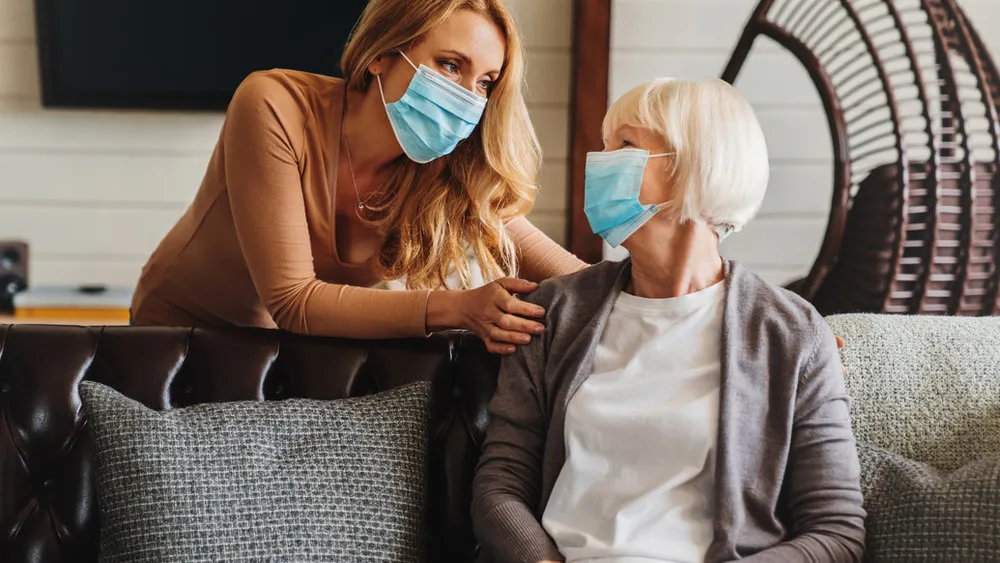Healthy Lifestyle
Can We Visit Grandma? Answers to Common Questions About Life After Your COVID-19 Vaccination
Published: March 1, 2021

With the introduction of COVID-19 vaccines, a powerful new tool arrived to help end this pandemic. In addition to guarding against COVID-19 infection, the vaccines have brought hope. There’s optimism that we’re finally on the path toward protecting our families, friends and neighbors and returning to some kind of normalcy.
But we’re not out of the woods. It’s likely going to be many months before we have enough people vaccinated for COVID-19 to not be such a threat. Yes, we should be hopeful, but also realistic. And whether you’ve been vaccinated or are awaiting your turn, you need to be informed about the vaccine’s abilities and limitations so you can keep yourself and those around you healthy.
Here are answers to common questions people have now that vaccines are becoming more widely available.
Can the vaccine give me COVID-19? I stopped getting the flu shot because it gave me the flu.
The flu shot doesn’t give you the flu, and COVID-19 vaccinations don’t give you COVID-19. It’s impossible. If you got the flu immediately after getting vaccinated, it’s likely that you were exposed to the virus before your vaccination or before it took effect.
The same can happen with the coronavirus that causes COVID-19. And in the case of the Pfizer-BioNTech and Moderna COVID-19 vaccinations, the first shot is at least 40-50% effective at preventing illness – meaning you’re still very vulnerable. Your body’s defenses don’t really ramp up until about two weeks after the second shot, or two weeks after the single-shot Johnson & Johnson vaccine. At that point, the two-dose vaccines are over 90% effective at preventing symptomatic and severe COVID-19. The Johnson & Johnson vaccine is about 70% effective.
I’ve made it this long without getting COVID-19. Can’t I just keep taking my chances?
Please don’t. We've seen the awful things that COVID-19 can do. We can’t foresee how long this coronavirus will be around and if it will become a long-term global threat. It’s a gamble to not be vaccinated. Doing so gives you another layer of protection, dramatically reducing your risk of having a severe case of COVID-19.
I had COVID-19 already. Should I get the vaccine?
Yes. We’re unsure how long natural immunity lasts after an infection, but we do know how effective our vaccines can be in protecting you from COVID-19.
I got the first dose of the COVID-19 vaccine and felt pretty crummy afterward. Do I really have to go through that again?
Yes. The most common side effects of the COVID-19 vaccine – pain or swelling at the injection site, fever, chills, headache, fatigue and muscle aches – are actually a good sign. That’s your body working to build its defenses. For the Pfizer-BioNTech and Moderna vaccines, that’s a two-part job. The first dose gets you on the path to protection. The second finishes the job of training your immune system to protect you.
Of course, stay in contact with your primary care provider. They can guide you on whether over-the-counter medications can help, and they need to know if your side effects worsen or don’t go away after a few days.
Does getting the vaccine guarantee I won’t get sick?
While it’s not a 100% guarantee, your risk of getting sick is dramatically reduced.
Can I still carry the virus and infect others after being vaccinated, even if I don’t have symptoms?
We’re not sure. While the available vaccines do an excellent job at preventing COVID-19 illness, research continues on whether you can still carry the virus and transmit it through breathing, coughing or sneezing. All the more reason to continue masking and maintain social distance wherever you go until we have more information.
I got the vaccine and so did my elderly mother, whom I haven’t seen in a year. Can I visit her now?
Yes. The Centers for Disease Control and Prevention (CDC) has announced that it’s generally safe to gather indoors with others, unmasked, two weeks after everyone is fully vaccinated.
What about children? Can the grandkids visit grandma?
With no vaccines available for children yet, this is riskier. But the CDC says vaccinated people can gather unmasked with unvaccinated members of one other household if no one in that household has an increased risk for severe illness from COVID-19. Think about your situation. As hard as it is, if you can’t ensure a safe get-together, you may consider waiting to visit loved ones.
So I’m still supposed to wear a mask, social distance and avoid large crowds? I thought I was protected.
While you will have significant protection from COVID-19, it’s not yet known whether you can still transmit it to others. Continuing to take the precautions we’ve adopted this past year can help keep others around you safe. And by continuing those good habits, you’re sending a message to others about what it still takes to keep everyone healthy. Now is not the time for people to relax because they see others letting up. Until more people are vaccinated and we achieve herd immunity, there's a risk of people spreading the virus and infecting others.
I heard there are coronavirus variants now. Will the vaccine protect me? Is it normal for viruses to mutate?
It’s normal for viruses to mutate – that’s why the flu shot is updated annually to protect against new strains. We don’t have the full picture yet as to whether our current vaccines protect against variants that cause COVID-19. In the meantime, getting an existing vaccination is recommended to protect yourself against the most common virus that causes COVID-19.
We’re Stronger Together
We’re at war with COVID-19. There’s been a lot of bad news over the past year, but here’s the good news: We have resources and a plan to fight back. We can turn the tide and win this battle. If you have further questions about the COVID-19 vaccine or how to keep your family healthy, contact a trusted health care provider.
More Resources
- Read about minimizing the side effects and maximizing the efficacy of your COVID-19 shot.
- Considering the COVID-19 vaccine during pregnancy? Here's what you need to know.
- Follow Methodist on Facebook, Twitter and Instagram for the latest COVID-19 updates.


